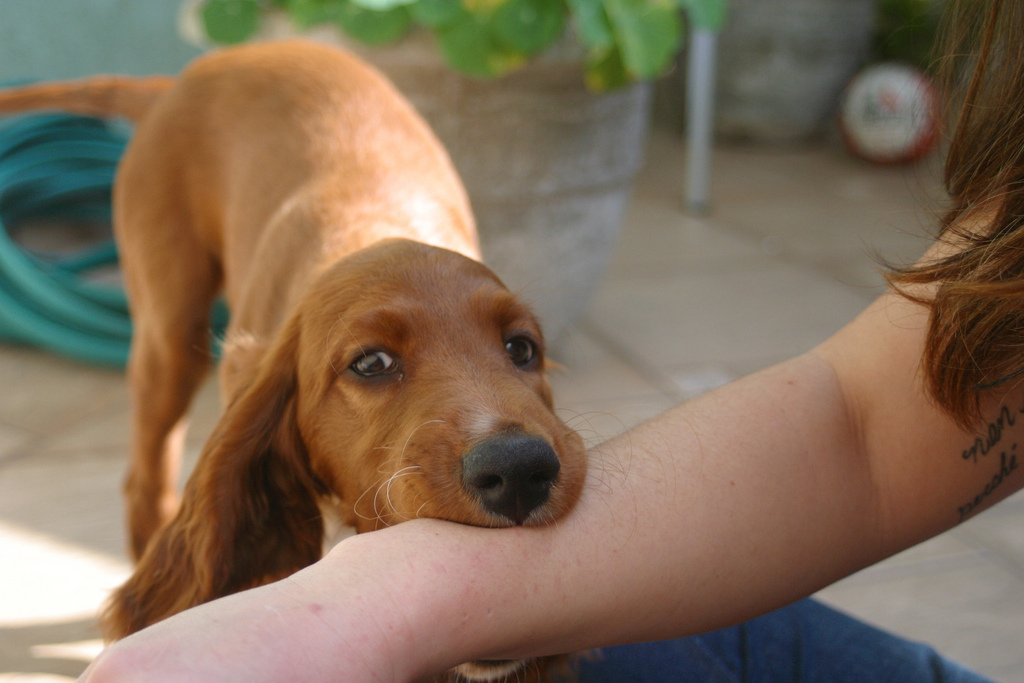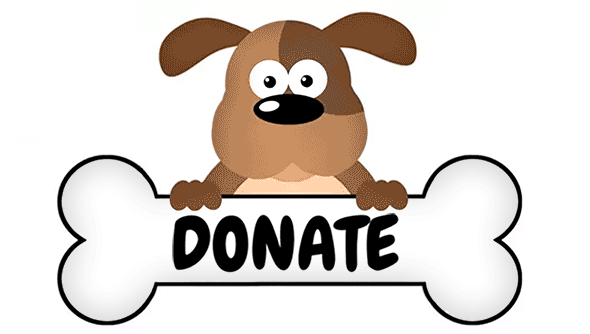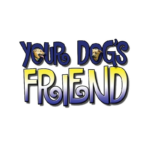 Biting / Nipping
Biting / Nipping
Nipping is one of the most frustrating issues to manage when you bring home a puppy or rescue dog. New puppy parents often worry that nipping is an early sign of aggression. If this concerns you, relax! Although very annoying, nipping is completely normal for puppies. They simply need to be taught that it is inappropriate behavior. We will talk more about nipping by adolescent or adult dogs later in this handout, but the concepts are the same.
Why is my puppy biting me? It hurts!
Nearly all nipping is your puppy’s way of getting your attention and trying to engage you in play. If you ever watch puppies or dogs play, you’ll notice that most of them naturally “play fight.” They chase, tackle, wrestle, and chew on each other. Although most puppies learn not to bite too hard (we call that “bite inhibition”), those needle-like baby teeth can really hurt when you don’t have fur to protect you! Ouch!
It makes sense that your puppy should nip at you too. It’s playtime, so what’s the problem? Your puppy needs to learn that this is not appropriate play with people. We can’t expect him to know this automatically. Good play with people is an acquired skill.
What should I do?
Puppies primarily bite to get our attention; they want us to interact with them. So we need to make sure that we aren’t inadvertently rewarding nipping. If attention is the goal, then your attention is the reward. While some people will suggest that you yelp or say “ouch,” it’s important to realize that this doesn’t work very well for many puppies. Most hear that noise and think: “Great! Now we’re playing! Game on!” If you yell, you have unwittingly joined in the fun. In fact, even looking at your puppy after he has nipped is allowing the behavior to pay off. Your puppy is seeking attention, and you just looked.
When your puppy nips, keep your cool. Don’t look at your puppy, don’t talk to your puppy, and don’t yell at your puppy. You have a few other options. You can calmly get a toy, put it in his mouth, and engage in appropriate play. This says to your puppy: “No, you may not bite my hands (or feet or arms…), but you can chew on this and I’ll give you my attention.” If no toy is nearby, you will want to simply get up and quietly walk away from your puppy to find a toy. Sometimes just walking away by itself will send a clear message.
What happens if my puppy keeps biting?
There may be times during the day when your puppy is extremely excited, racing around and biting everything and everyone in sight. Looking away or initiating play with a toy is useless. You might think about this as being equivalent to that overly tired 2-year-old child who will scream, cry, hit, or throw a full-blown temper tantrum when what he really needs is to sleep—the exact opposite of what he is showing you. Puppies can also become overly tired and turn into crazy biting machines without any sense of bite inhibition. It’s as though your puppy has turned into an alligator!
Time for a nap! If you are using a crate with your puppy or perhaps a small room blocked off with a baby gate, put your puppy in this space with a very high value treat, preferably something edible that he can lick or chew for an extended period of time. Good options are a bully stick or a delicious stuffed Kong (preferably one that has been frozen to make it last even longer). Most puppies will be sound asleep in five minutes. Be sure you don’t use your crate as punishment. Always be sure to give your puppy that good treat in the crate.
Can training help?
Absolutely! Training can be very helpful. If your puppy learns to target your hand, you can use “touch” to redirect your puppy to do something else. “Leave it” can stop the behavior before your puppy is getting ready to nip. Teaching a “drop it” cue will tell your puppy to let go of hands, clothing, or anything else he has in his mouth. There are all sorts of ways of redirecting that puppy energy. So taking a class with your puppy will help you better manage his nipping.
Reward the good things!
You may find yourself worn out by your puppy. Housetraining and managing your puppy’s environment to keep him and your possessions safe is hard work. As a result, we tend to pay attention to our puppies only when they are doing something bad. But if you want your puppy to cut back on the biting, you need to be sure to reward the things that you like. Good quiet behavior should be rewarded. A puppy playing by himself should be rewarded. A puppy that brings you a toy or approaches without nipping should be given attention. He needs to know not only what you DON’T want, but also what you DO want instead. And don’t forget that puppies have a natural urge and need to chew, so be sure you give him lots of fun things that he is allowed to chew.
Beyond Puppyhood
Nipping and mouthing in adult dogs can be handled in the same manner. Consistently substituting a toy for your hands or simply moving away from your dog when he exhibits this behavior will often work. If you find that the problem persists, it is important to work with a qualified positive trainer to determine the underlying cause of the behavior and come up with an effective training plan. This sort of behavior in adult dogs rarely goes away on its own and can sometimes escalate if it is unknowingly being reinforced. So you will want to address it sooner rather than later.
Key Points to Remember
- Although it can be annoying, nipping is normal puppy behavior. It’s how puppies try to get you to interact with them.
- Any attention you give your puppy when he nips is rewarding, and may even seem like you’re joining him in play.
- Remember to give your puppy attention for the good things he does – like calmly playing with a toy.
- Your canine companion needs to understand what is acceptable behavior just as much as he needs to learn what is not acceptable. “You can’t nip me, but you and I can play with this toy.”
- If substituting a toy or chew for your hand doesn’t help, you may need to just walk away. Your puppy nipped, and now he has lost his “playmate.”
- Puppyhood is when you should teach your dog “bite inhibition.” If you don’t work on nipping now, you may end up with an adult dog whose bite, even when taking food, is harder than you want.
- An overtired puppy can seem to have more energy than he (and you) can handle. Maybe, it’s time for a nap.
- Training your puppy or adult dog to “touch”, “leave it”, and “drop it” can help your dog learn to redirect his energy and focus from nipping to something more appropriate.
Resources
www.smartdoguniversity.com/puppy-biting-solved/ – Smart Dog University article and video on puppy biting
Attend Welcome Home, Pup!, a live, free monthly webinar full of practical tips and advice for anyone who has recently welcomed home a rescue, foster dog, or new puppy.
Still Need Help?
Contact Your Dog’s Friend at [email protected] or (301)983-5913 for advice and referrals or check out our list of recommended trainers and behaviorists.
Your Dog’s Friend is a nonprofit 501(c)(3) organization working to improve dogs’ lives, reduce problem behaviors, and keep dogs out of shelters, by educating and supporting their humans.
This material is not intended to be a substitute for professional help when dealing with dogs with intense or potentially dangerous behavior issues. Consult a positive reinforcement trainer or veterinary behaviorist for professional assessment, guidance, and support.




